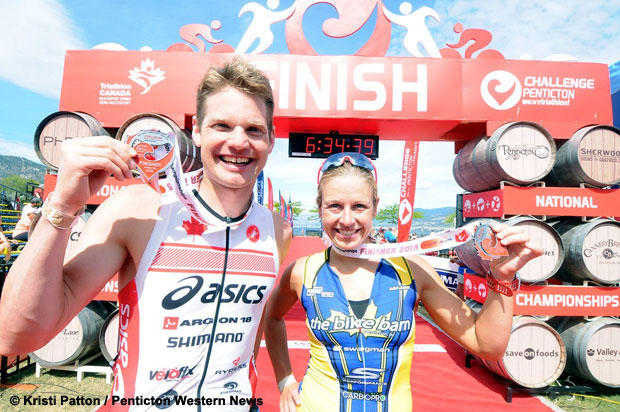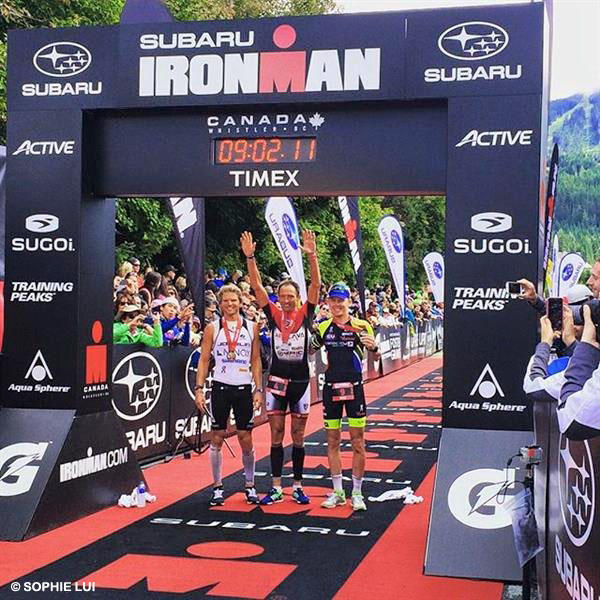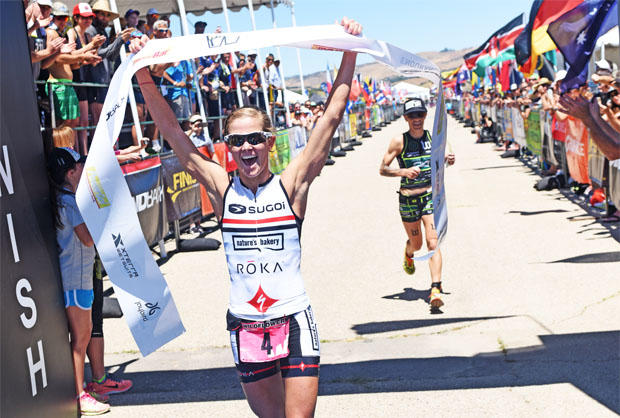Jen Annett seized the day
After her usual middling swim, Jen Annett took off on the 120-kilometer bike leg and quickly erased Liz Lyles' 3 minutes 45 seconds lead. By the end of the ride, Annett fashioned a 3 minutes and 15 seconds lead on the established star. The ride went so smoothly that Annett ignored the fact she almost lost her life riding her bike on these roads back in 2008 when she was hit by a car. She recovered from those orthopedic injuries, but that collision triggered something far more serious that would threaten her neurological well being.
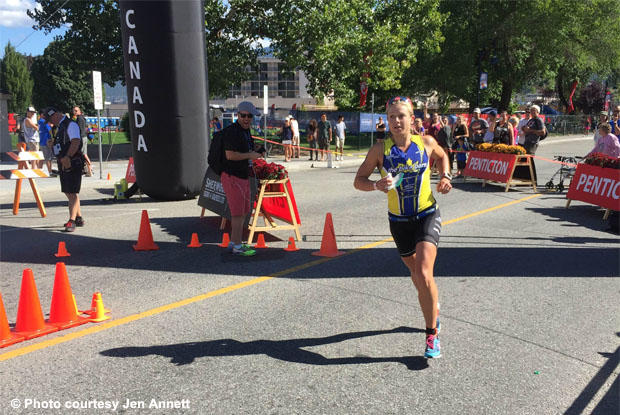
That 195 seconds lead would seem to be the high water mark of Jen Annett’s day at Challenge Penticton, her home town race, where everybody knew her and loved her and knew how far she had traveled to get to this level of triathlon accomplishment.
Realistically, Annett should have been satisfied with that ride. After all, Liz Lyles had three sub-9 hour Ironmans and a 3:01:14 Ironman marathon to her credit, a win at Ironman Brazil, a 2nd-place at Ironman Frankfurt, a 7th place at Kona, and a come-from-behind win against another star who was working on a four-peat at the classic Wildflower long course. And Annett had already played her ace – the bike leg on those hilly roads around Skaha Lake.
After her superior rides, she has a history of getting run down by the greyhounds and gazelles on the run while she grits out those final miles.
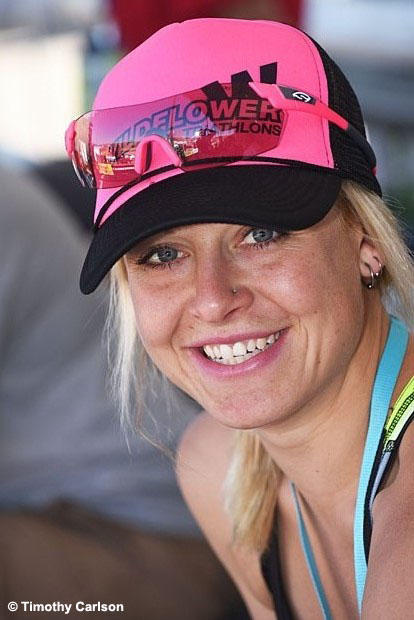
“I will be honest, it was set in my mind that Liz would win,” said Jen. “She is a very well rounded world class athlete and is an incredible runner. I think with that mindset, I was OK with the fact that she would (and did) catch me and take the lead with only 5km or so to go. But she ended up staying about 15 seconds ahead and didn’t open that gap.”
Jen Annett has improved in the past few years. After she turned pro, she finished 3rd overall woman at the 2013 and 2014 editions of Challenge Penticton at the full Ironman distance. She also took 3rd overall woman at Ironman Canada in Whistler in 2015 while posting the fastest run split (3:15). But those results had been her glass ceiling, a limit that many people would accept with resignation.
Besides, fighting back would demand that Jen enter strange new territory where she would be, as she put it, “so maxed out in a zone I never knew I had.”
Fighting epilepsy
The funny thing is, Annett has already fought a bigger battle against an unrelenting enemy. And she refused to surrender when doctors said she should give up her joy in her sport, and be satisfied with simple survival.
“I started having partial seizures after I got hit by a car while I was on my bike, training for the Ironman World Championships in Hawaii,” recalled Annett. “These spells went undiagnosed for 2 years. The doctors just kept brushing off these ‘feelings’ as electrolyte imbalances from my training. I continued to race triathlon and Ironman, and it wasn’t until December of 2010 that I had my first grand mal seizure.”
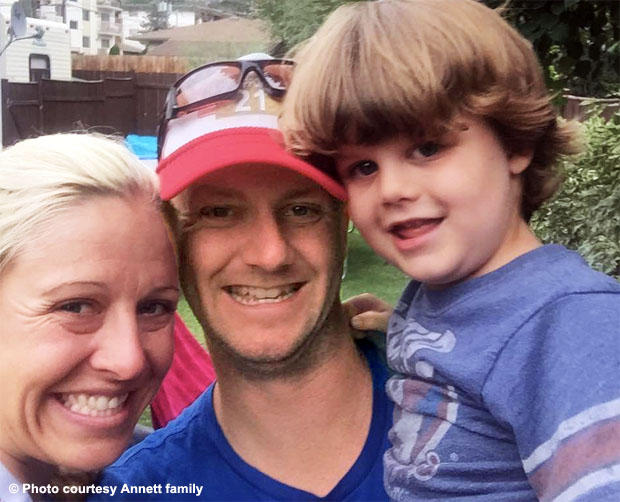
Jen was supposed to pick up her husband Jason from work but he called her because she was late, and woke her up from the couch. “I didn’t remember getting there," she explained. "He asked me if I had been drinking because I sounded like it. I also had a lump on my forehead that I didn’t know where it came from.” She was confused, but just brushed it off.
The next day she was helping a client at the bank where she worked when her whole world collapsed. “The next thing I knew, I was on the ground with paramedics standing over me,” she recalled. “I had fallen off the chair and was convulsing against one of the back counters. I had also lost control of my bowel and bladder right in front of my clients and fellow employees. I was so embarrassed but at the same time had no idea what was going on. The paramedics kept asking me questions like ‘What day is it?’ I knew the answers but somehow my brain couldn’t connect to my mouth. What was going on?! They took me in an ambulance to the hospital, and I spent a couple days there getting tests.”
After looking at her EEGs and MRIs, doctors explained that she had been having partial seizures for two years and put her on medication and scheduled a visit with a neurologist. “My appointment did not go well,” she wrote in a blog. “I left his office devastated. He told me that I couldn’t drive, bike by myself, or even have a bath by myself. I was also told that if we wanted to get pregnant, that I probably wouldn’t have a normal kid. I felt like my life had ended. I was only 25. How could this be happening to me? I was healthy, an Ironman athlete, and had no history of seizures in my family.”
Annett sought a second opinion and another neurologist explained that she had epilepsy – but he saw a way forward with more hope. “We talked about a plan for me to get pregnant, and I was educated on the birth risks (which were not that much higher than a person not on medication). Because I had no seizures the previous 6 months, we decided to try to wean me off the meds – or at least to the lowest dose possible – so that we could get pregnant. I managed to get down to a next-to-nothing dose, and then found out that we were in fact pregnant!”
All went well until she started getting those 'spells' again at the end of her first trimester when the risks are highest. Doctors increased her dosage, but at five and a half months, she suffered another grand mal seizure. Doctors rushed her to the hospital for tests. “They told me I stopped breathing during the seizures and lack of oxygen can cause brain damage to the baby. Thank God, everything was OK and the baby appeared healthy. I continued to have similar ‘spells’ through the rest of my pregnancy, but somehow, we ended up having a perfect little boy.”
For the next year, Annett continued to fight the ‘spells’ with medication plus several natural remedies including acupuncture, naturopathic treatments, and diet changes. The symptoms alleviated but then the spells returned. “I was frustrated but determined not to let this condition ruin my life.”
She signed up for Challenge Penticton, went back to work, and started training on her lunch breaks. With the support of her husband, things went well and she started finishing on the podium at all her age group races. Her doctors advised against her continuing with sports because of the risk of seizures in the water or on the bike. Annett adapted to the risks by making sure she always did open water swims and long bike rides with a partner. And she wore a different color swim cap and alerted water safety personnel to watch out for her in races. “However, the harder I trained the less I had these little spells and I never had a grand mal.”
After turning pro and placing 3rd at the 2013 edition of Challenge Penticton, she decided to cut back her training for the off season. That is when she discovered that her activity, not rest, was the secret to her treatment. “Whamo! I had four grand mals in one day," she said. This setback included a stay at an epilepsy clinic in Vancouver, 12 months of no driving, overall exhaustion and short term memory problems. Just when all seemed lost, doctors put her on a new drug, she resumed training, and she turned the corner.
She continued to work at her job, started to train and race, and, to her surprise, scored another top 3 at the 2014 edition of Challenge Penticton. “Life will always present you with unexpected things that you have no control about,” she says. “It is up to you to have the attitude you want. I know that this condition will be a battle my whole life, but I just have to make the best of it as it comes.”
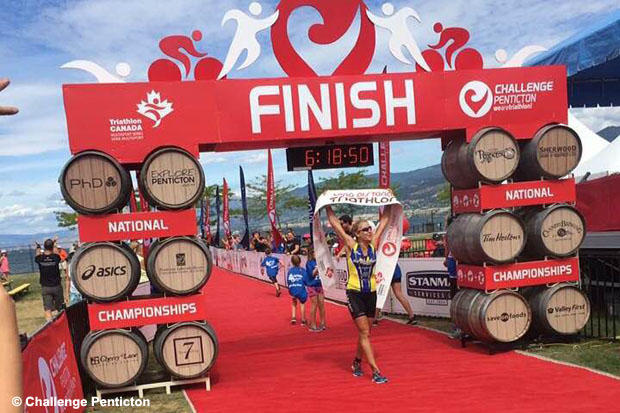
Digging deeper
When Annett got to Lakeshore Drive with a mile to go at Challenge Penticton, “There were many inspirational moments that flashed through my head, [such as] Liz [Lyles] herself with her sprint finish at Wildflower in 2015 for the win. [And fellow Penticton resident] Jeff Symonds and his ‘pull away’ moment to win Melbourne in 2015.”
With 500 meters to go, Annett found the strength. “I dug deeper than ever before,” she said. “I am very competitive and stubborn by nature, and I truly believe that mental strength is sometimes more powerful than physical strength. I wanted that win so badly, and Liz was so close. There were so many hometown fans screaming at me. I knew I had to try. I honestly don’t remember much of that last kilometer. I had a slight moment of doubt that perhaps I had sped up too early, but just told myself how much that win would mean, not only to myself but to my family and the community.”
Lyles was headed for a women’s-best 2:00:30 split for the 30 kilometer run – a 2:49 marathon pace – when she passed Annett with 5 kilometers to go. At that point, Annett lost her 3 minute lead and hung on for dear life. But Annett fought back and won the final 500 meters – and the race – by 30 seconds.
“It was so amazing to finish in first after that battle,” said Annett. “It was not only a battle for first, but it was a confidence booster that I could dig into a ‘power’ – for lack of a better term – and hold it to the end. Now that I am racing at this level, I realize more and more how important these moments are and the role that they will play in future races.”
Besides her breakthrough in self-belief, the recent influence of her first coach Jonathan Caron, and the absolute backing of her husband Jason, Annett gives credit to the close-knit Penticton triathlon community. “I can’t even describe how much it means to race in my hometown,” she says. “This experience definitely topped all others. When you race as a local athlete, the support is not just physical, but also emotional. I would never have made it to this level if it weren’t for the local support. My family was out there on Lakeshore as I was coming in from my first loop of the run and I stopped to give my 4-year-old son Nixon a high five and a ’big sweaty kiss,’ as he would say. As I was coming in on Lakeshore Drive to the finish, everyone in that last 1.5km seemed to know me and they were screaming at me to catch 1st! ”
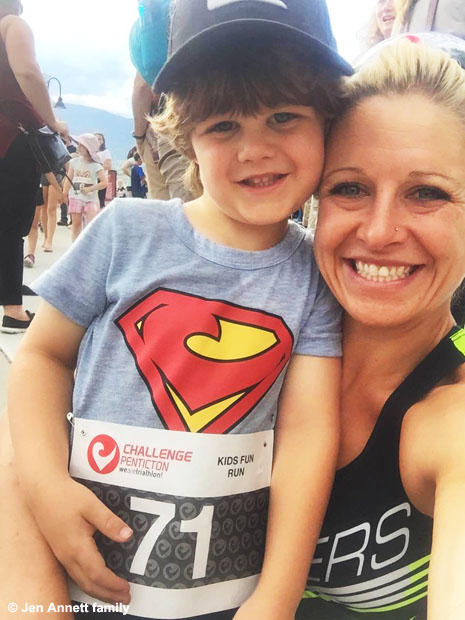
After the race, Annett says there wasn't a lot of conversation with her son right after the finish. “He can get shy around big crowds and there was so much going on!” But in a quiet moment, he asked her if that “big sweaty kiss” made a difference: “That made you run faster?! So you won?!”
Why yes. The miracle kid – the kid that one doctor said had no chance to be born to a mother with epilepsy – had a lot to do with it.



